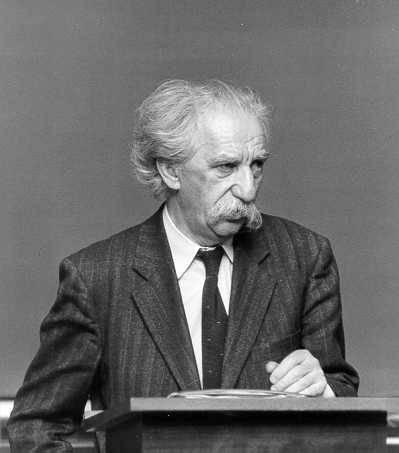
YURY LOTMAN (28. 02. 1922, St. Petersburg — 28. 10. 1993, Tartu) — Russian philosopher and semiologist. He was born into a family of lawyers. In 1950 he entered St. Petersburg University, where he studied philology under Vladimir Propp. After the defense of his Ph.D. thesis in 1961 he went to Tartu University (Estonia), where he held the post of professor until his death. In 1964 became the first editor of the world-famous journal Sing System Studies and initiated an Annual conference on Semiotics, which still take place every year.
Kristeva considers him to be the first Russian structuralist, who became famous with his book On the Delimitation of Linguistic and Philological Concepts of Structure (1963) and his Lectures on Structural Poetics (1964). His treatment of creative structures of language was close to that of Levi-Strauss; he supposed textual mechanism to be the center of a cyclical-temporal motion of culture. 'Texts created in this way are not, in our sense of the word, plot-texts and, in general, could only be described with great difficulty by means of our usual categories' (The Origin of Plot in the Light of Typology).
He also shared the structural idea that the subject totally belongs to the language that he is speaking and thinking. Culture creates a man, makes a world where he lives; therefore culture has nothing in common with objective reality, but it makes that reality. 'Sound and a language are not one the same. Human culture speaks with us, i.e. communicate information to us, in many different ways' (Semiotics of Cinema). Words create verbal images, which depict reality, they neither reflect nor copy it. 'The verbal image is virtual. In the reader's consciousness it appears as open, uncompleted and not incarnated. It palpitates and counters to the ultimate materialization' (The Structure of the Artistic Text).
He substantively came to the idea of intertextuality, when he considered culture to be a confrontation of texts with anterior and surrounding languages. 'Both groups of texts have their corresponding conception of the universum as a whole. The law-forming center of culture, genetically arising from the original mythological nucleus, reconstructs a completely regulated world, equipped with a single plot and a higher meaning' (The Origin of Plot in the Light of Typology). Basing his argument upon Bakhtin's views, he maintains that in cultural dialog the texts generate the meaning of language. He regarded literature and art as a 'secondary modeling system', which recasts the primary logic of language according to new lingual rules, conferring new mental possibilities.
-=-
Lotman Yu. Analysis of the Poetic Text. Transl. by D. Barton Johnson. Ann Arbor: Ardis, 1976;
Lotman J. Semiotics of Cinema. Transl. by Mark Suino. Ann Arbor: University of Michigan Press, 1976;
Lotman J. The Structure of the Artistic Text. Transl. by Gail Lenhoff and Ronald Vroon. Ann Arbor: University of Michigan Press, 1977;
Lotman J. Semiotics of Cinema. Transl. by Mark Suino. Ann Arbor: University of Michigan Press. 1981;
Lotman J. Universe of the Mind: A Semiotic Theory of Culture. Translated by Ann Shukman, introduction by Umberto Eco. London and New York: I. B. Tauris & Co Ltd., 1990;
-=-
© Dmitry A. Olshansky, M.A. in Philosophy (St. Petersburg)
E-mail: olshansky@hotmail.com
